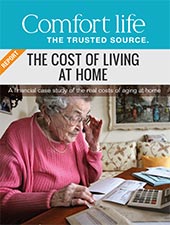The confirmation that my father Rico had Alzheimer's Disease came as a crushing blow to the entire family. I was in denial, initially challenging the diagnosis. My father was retired, enjoying his annual winter holidays in the Caribbean, and it was hard to realize that one day he would become helpless.
My father's slow decline began in 1993. His last act of love was to walk me down the aisle, smiling proudly in a way that warmed my heart. Time stopped when I watched my mother and father dancing. Dad was a good dancer and, when it was my turn, I eagerly followed his lead to his favourite foxtrot.
As his illness progressed, I treated my father as normally as possible, including him in all the family holiday activities. I was proud of his strength and acceptance of this dreadful disease; "Damn it" was his only comment. He had a difficult time adjusting to his new home in 1994 in a health-care facility, although it provided a comfortable environment.
We learned that the Alzheimer patient perceives strangers as threatening and will strike out in fear. As a family, we worked out a schedule that would keep my father surrounded by comforting familiar faces, in contrast to the daily facility caregiver changes.
My visiting routine on Tuesdays and Thursdays began at 4 p.m. and ended at 10 p.m. First I would gently wake my father from his rest with homemade juice, which always prompted a smile and sometimes a comment: "That's great!" This was followed by a bath, shave and dress in his best street clothes to have dinner. Frequently, I brought homemade foods, which delighted him. Afterward, we would leave the building behind and walk in the parks in the summertime and in the mall during the winter months. These outings of fresh air and exercise were stimulating and relaxing for both of us, and a remedy for mood swings and depression.
In 1995, my most courageous undertaking was to take him for two weeks to Jamaica, our country of origin. The tranquility and lush vegetation stimulated Dad's conversation and assertive behavior; it gave my mother and me a jolt when he disappeared from his bedroom. After a frantic search, he was discovered heading towards his childhood home in Kingston with a hairbrush in hand, his pajamas and a determined stride despite his bedroom slippers.
Just like children, patients with Alzheimer's Disease require constant vigilance. As a 24/7 caretaker in Jamaica I rested during his rest periods and swam late at night after he went to bed. This quiet time with my mother in the pool was enjoyable and supportive. Water was very therapeutic to Dad, but to my dismay, I discovered that he couldn't remember how to swim. He had been a very strong swimmer, participating in cross-the-harbour swims in his younger days; he enjoyed this activity until this ill-fated disease changed the course of his life and ours.
On our return flight to Toronto, Ontario, he became impatient and demanded to get off the plane. I calmly told him to look out the window at the clouds and pointed out that our flight height was 33,000 feet, and he would fall and freeze. He sat down and said, "You have a point."
Looking back, I would do that trip again, for the sheer pleasure of watching my father enjoy his favourite foods. It was also gratifying to see my parents interacting affectionately. My father passed away in November 1999. His last words to me were, "I love you more than you know."
Comfortlife.ca offers more information about and lists homes with Alzheimer's care.



